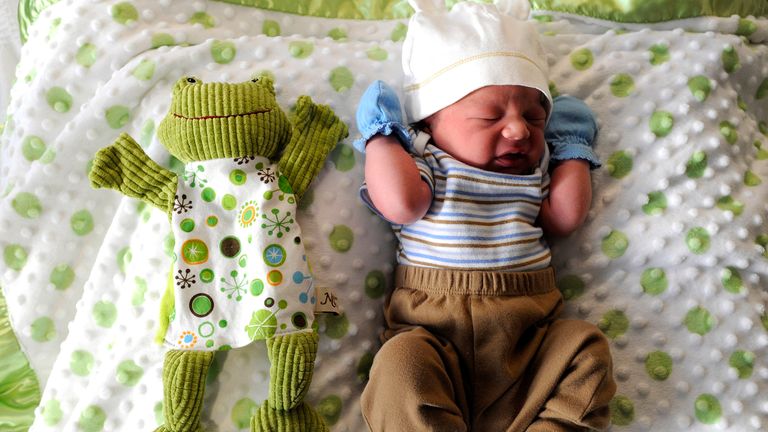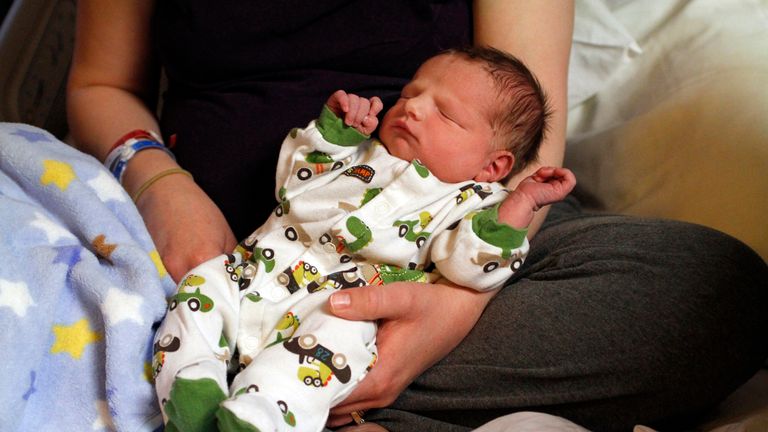What if we didn’t have leap years? Maybe you haven’t given it much thought.
But people born on a “leap day” have given it many thoughts.
We’ve spoken to a number of them and asked about how their date of birth has affected their lives.
“I just want people to know that my birthday does exist,” one 29 February-born woman told Sky News.
We’ll get to that shortly.
First, what’s the deal with leap years anyway?
What if we didn’t have them?
A leap year means there’s an extra day in the calendar – 29 February.
They were introduced because most modern calendars worldwide have 365 days in them, but the actual solar year – the length of time it takes for the Earth to orbit the Sun – is approximately 365.25 days.
NASA explains: “To make up for the missing partial day, we add one day to our calendar approximately every four years. That is a leap year.”
If you don’t add that extra day approximately every four years, our calendars would eventually fall out of sync with the seasons.
Leap year origins
The leap year is thought to have been introduced by the Egyptians to balance the seasons in the third century BC.
They were observing a 365-day year that included a leap year every four years to correct the calendar, according to the National Geographic.
Pic: AP
But this wasn’t quite working long-term, because a solar year still isn’t exactly 365.25 days – it’s just a tiny bit shorter at 365.2422.
It meant that even with a leap day every four years, each calendar year was about 11 minutes shorter than the seasonal calendar, meaning the calendar ended up being an entire day short every 128 years.
By the 16th century, the Romans decided to take drastic action, as they believed Christian holidays were being celebrated on the wrong days.
Pope Gregory XIII unveiled his own Gregorian calendar in 1582, and dropped 10 days from the month of October that year to sync things back up with the seasons.
The National Geographic said: “He also developed a new leap year system that used the solar year of 365.2422 days, added one leap day every four years, but dropped three leap days every 400 years to keep the calendars from drifting.”
Leap day traditions
One inadvertent tradition that comes with a leap year is full-time employees doing an extra day’s work for free.
That’s because if you’re paid a fixed annual salary, it doesn’t change based on how many days there are in the year.
If you’re paid by the hour, however, 29 February could be your lucky day, because if you’re working extra hours on the Thursday, you are entitled to claim those hours in the same way you do on any other workday.
Women proposing to men
This one’s a bit more fun.
29 February is known for being the day when women can propose to men.

Pic: iStock
You might be thinking: “But women can propose to whoever they want, whenever they want.”
But the tradition is believed to have started hundreds of years ago in an attempt to give women more power in their love lives.
Irish legend has it that St. Brigid of Kildare, a nun, complained to St. Patrick that maidens had to wait too long for potential suitors to propose.
So St. Patrick was forward-thinking enough to offer them one day every four years where women had the same proposal rights as men.
Proposal penalty
In 1208, the Scots not only adopted the proposal tradition, but also supposedly passed a law stating that any man who rejected a leap day proposal would have to pay a fine.
In other European countries, particularly in affluent areas, another penalty was that the proposal refuser would have to buy the woman he denied 12 pairs of gloves.
Bad luck?
There are certain nations where leap years and days get a bit of a bad rap.
Like in Greece, where superstition dictates that any marriage beginning during a leap year is destined for divorce, or in Italy, where Romans once believed February was a bad month that should be dedicated to the dead – therefore extending it was simply depressing.
Another Scottish superstition claims that anyone born on a leap day is doomed to have a life of suffering.
What it’s actually like to have a leap day birthday
Sky News has heard from a lot of people born on leap days, who are unofficially known as “leaplings”.
And thankfully, none of them appear to be having the sort of bad luck that Scottish superstitions prophesise.
Most 29 February babies are happy to be leaplings, Nicole Garcia tells us. Nicole, a mum of two from Michigan, is turning 11 this year, she says.
She’s given us her leap year birthday, of course, something that she often does when asked her age.
“I’d rather be younger,” she jokes.
Nicole is an admin of the Facebook group “February 29th, LEAP YEAR BABIES!”, which has almost 4,000 members who share the same birthday. And me, who asked to be let in.
If you’re a 29 Feb baby feeling a bit of leapling loneliness, it’s the place to be.

A baby born in Texas on the leap day in 2012. Pic: AP
When asked their age, many members either follow Nicole’s lead and let you do the maths, or they’ll give you two numbers – their actual age and their leapling one.
Pros and cons
Most of the feedback we got from the group’s members suggested they love having such a unique birthday, but that a surprising amount of people don’t actually have any understanding of what a leap day is.
“Some people don’t even believe you when you tell them. I just want people to know that my birthday does exist,” Nicole says.
Her birthday might only come around every four years on paper, but she has found a satisfying alternative.
“I decided to take an extra day. I celebrate on the 28th and the 1st,” she says.

A baby born on 29 February 2012 in Kansas. Pic: AP
A lot of leaplings do this, apparently, but the law can actually dictate when leaplings’ common-year birthdays are. In the UK, for example, they legally become a year older on 1 March.
Even though important documents like birth certificates and passports can say 29 February, going with your assigned alternative birthday can become a necessity when filling out online forms, because a lot of them don’t provide 29 February as an option.
It can be an issue in the flesh, too. Geri Rafferty, another leapling from the US, remembers turning 21 – the legal age for drinking in America – in 1985 and going to the shops on 28 February to buy a bottle of wine to share with a friend.
She said the store clerk looked at her ID, which said 29 February, and refused to sell her the alcohol, insisting that her birthday was the next day, even though there was no 29 Feb that year.
Geri said: “I was so mad! My friend bought me the wine and we had a great celebration. The next day [1 March], I returned to the same package store and picked out the same bottle of wine. I slammed it down on the counter and told the clerk that now I was ‘officially’ 21 and could buy my own alcohol! The celebration continued that night as well.”
Selina Paggett, who is turning 16 – or 64 – suggests her mum must have known about the trouble a leap day birthday would cause her in the future.
She says: “After my birth early morning (2.34am, 1960), my mum pleaded with her doctor to enter Feb 28th on my birth certificate instead of Feb 29th. The doc replied: ‘NO ma’am, I will not falsify this document.'”
Canadian Claudia Femia, who’s turning 13 (52), said her mum had the opposite experience and was asked to change her birthday to another day when she was born.
Two leap day world records
Being born on a leap day is already an anomaly, but here are some seriously rare occurrences logged by Guinness World Records.
A world record was presented to the Henriksen family in Norway in 1968 for most siblings born on a leap day – and no, it wasn’t triplets.
The three children of Karin and Henry Henriksen, Heidi (b.1960), Olav (1964) and Leif-Martin (1968) were all born on leap days.
Then there’s the record for most generations born on leap day, which was awarded to the Keoghs in 1996. The Irish family had Peter Anthony (1940), his son Peter Eric (1964) and his granddaughter Bethany Wealth (1996), who were all born on 29 February.







